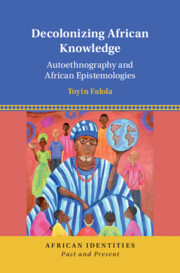Book contents
- Decolonizing African Knowledge
- African Identities: Past and Present
- Decolonizing African Knowledge
- Copyright page
- Dedication
- Contents
- Figures
- Notes on Language and Orthography
- Preface
- Acknowledgments
- Part I Introduction
- Part II History, Fictions, and Factions
- 3 Narrative Politics and Cultural Ideologies
- 4 Memory, Magic, Myth, and Metaphor
- 5 A Poetological Narration of the Nation
- 6 A Poetological Narrative of the Self
- 7 Satire and Society
- 8 Narrative Politics and the Politics of Narrative
- Part III Visual Cultures
- Part IV Conclusion
- Bibliography
- Index
4 - Memory, Magic, Myth, and Metaphor
from Part II - History, Fictions, and Factions
Published online by Cambridge University Press: 23 June 2022
- Decolonizing African Knowledge
- African Identities: Past and Present
- Decolonizing African Knowledge
- Copyright page
- Dedication
- Contents
- Figures
- Notes on Language and Orthography
- Preface
- Acknowledgments
- Part I Introduction
- Part II History, Fictions, and Factions
- 3 Narrative Politics and Cultural Ideologies
- 4 Memory, Magic, Myth, and Metaphor
- 5 A Poetological Narration of the Nation
- 6 A Poetological Narrative of the Self
- 7 Satire and Society
- 8 Narrative Politics and the Politics of Narrative
- Part III Visual Cultures
- Part IV Conclusion
- Bibliography
- Index
Summary
This chapter furthers the discourse on “narrative” with specificity on “magic, memory, myth, and metaphor.” Herein, the chapter shows that the knowledge of the past is preserved in oral vehicles as “songs, images, poems, rituals and religions, stories and myths,” as memories not only preserve but sustain them by transporting them to succeeding generations, using narrative when evoked. It also examines memory’s limitations, especially when compared to history. They include “bias (of the narrator), misinformation, infallibility and the impossibility of rightly (in)validating (individual) memories”–the lack of corroborator. It is also prone to manipulation and subject to the narrator’s interest, while the information processed and stored as memory can also fade over time owing to the collection of new memories. In the Yoruba context, the chapter highlights the relationship between “Itan” and “Aroba,” with the major distinguishing factor being their timeframe from the period of happening. The chapter also dwells on collective memory, which relies on individuals’ narration to become one because no one person was present everywhere to witness everything at once. Lastly, there is the clarification of the different problems in African epistemology, such as magic and the likes.
- Type
- Chapter
- Information
- Decolonizing African KnowledgeAutoethnography and African Epistemologies, pp. 70 - 98Publisher: Cambridge University PressPrint publication year: 2022

